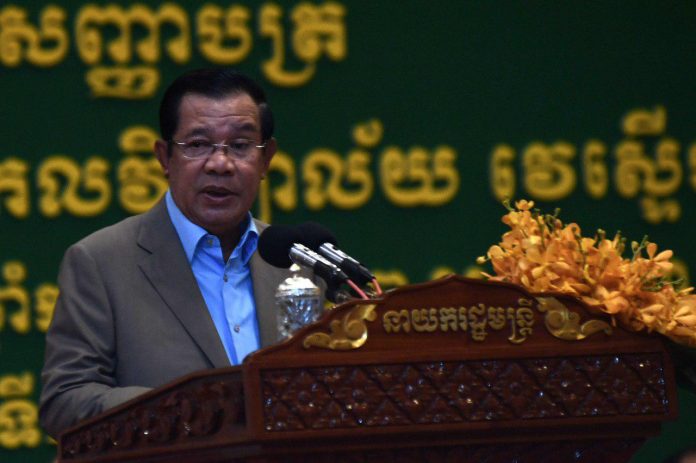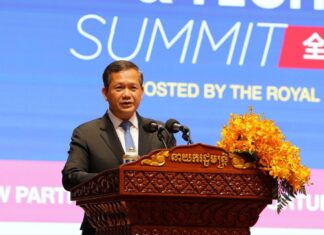Two Drills in Progress
I am happy to join with you on this graduation and diploma presenting ceremony. I think I will have one more of such schedule next week […] please allow me to take this chance to inform our people of two drills in progress. The first drill was for disaster management and response for air crash incidents. It is being conducted at the Siem Reap International Airport […] another military drill in Svay Rieng was for coordinating assistance between Cambodia and Vietnam should there be disaster along the two countries’ border. As you may have noted these two drills, please do not be concerned and refrain from sharing incomplete or false news online […]
Abundance of Natural but without Human Resource Could Not Become Rich
The Royal Government has been concentrating on development of human resource. Without human resource, a country could have achieved nothing. I used to share with you about one fact that a country with abundance of natural but without human resource would not be able to make the country prosperous. Cambodia has plenty of natural resource but the country is still a poor one. Why? This is relating to wrong choice of political leadership from one stage to another. It is fortunate that we have withdrawn the country out of war in 1998. Prior to this date, by involving in destructive wars […] the popular socialist Cambodia built by Samdech Preah Sihanouk Preah Borom Ratanakaod came to destruction after the coup on 18 March 1970, followed by the genocide of Pol Pot […] the “land of gold” that we called our country is still poor. Singapore could not even have drinking water of its own but, with human resource, they are becoming a rich country […]
Three Working and Leadership Methodologies
What we have learnt in school would not be similar to what we will be dealing in real […] to rule a country, it is necessary to be prepared for force majeure. I have lectured the political school of the Cambodian People’s Party these topics on methodology for leadership/management and works […] a leadership has to have a plan. With the preparation of a good plan, the work is 30% done […] without implementation of the plan, the 30% accomplishment is equal to nil. It is important that once we have put together a good plan, we must organize and implement the plan. This is where “your will to do thing could not be beyond your (resource) ability” […] once the two make 60% of the process, another 40% of the job was to deal with force majeure. That is where I used to say it would reveal clearly their capability […] the financial law for management of 2020, for instance, may have come across somewhere down the road in 2020 drought/flood or other kinds of disasters.
Delegation of Power to Subnational Authorities
Both national and sub-national authorities will seek to resolve the force majeure because the financial plan does not anticipate them. The first type of officials would report what happened to senior level and blamed his/her officials under their ranks. The second type of officials would, together with people and resource they have, deal with the issue […] We are working now to delegate functions and powers to subnational level authorities so that they would be able to deal with local issues. It would be far to reach out from national level but we would have to transfer the subnational authorities with functions and resources, financial and human, to carry out their jobs and responsibilities. We cannot just give them empty power. Lately, concerned ministries may have noticed already that I asked Samdech Krolahaom Sar Kheng to prepare, and I will approve and sign, a sub-decree listing functions for subnational level bodies to carry out […]
Use of French Language
Western University has capability to send their students for competition because the University has a strong English language curriculum. Two weeks ago, we had this gathering in Phnom Penh of governors/mayors of cities using French language. In my meeting with the General Secretary of Francophone, I told him about what happened in the three French-speaking members of Francophone – Cambodia, Vietnam and Laos. As we are members of ASEAN, using English as official language, the three seemed to have used English language more […] in 1982, in Paris, as Deputy Prime Minister and Foreign Minister […] I told a group of French Members of Parliament about alarming low use of French language in Cambodia. I asked them to consider opening Alliance Francaise in Phnom Penh. A member of parliament then denied the chance on ground that the French government did not recognize the Phnom Penh government […]
Cambodia, however, is not abandoning French as a language. We will continue to take part in Francophone communities. I have requested the Secretary General of Francophone to help Cambodia to send troops to countries speaking French. Among five countries that Cambodia sends its troops for the UN peacekeeping missions, three of them are speaking French – Lebanon, Mali and Central African Republic. Cambodia is using French widely in medicine and law. I have asked the Secretary General of Francophone to find ways to strengthen use of French language in Cambodia […] in general, Cambodia sends bilingual officials working in the ASEAN and/or other international frameworks, or instance for the ASEAN cultural community, we have Dr. Hang Chuon Naron – using three languages English, French, Russian, and even Spanish.
Three Major Historic Events on 2 December
For me, on 2 December there are three major historic events. Firstly, 2 December 1978, we announced the establishment of the National United Front for Salvation of Kampuchea. Secondly, on 2 December 1987, at Fere-en-Tardenois, France, there was this Sihanouk-Hun Sen meeting to begin the process of historic political settlement to the Cambodian problem. Were there no historic 2 December 1978, there would not be 2 December 1987, and there would be no 23 October 1991 – the Paris Peace Agreement. There is this other 2 December (1998) when I set out this triangular strategy that we rarely talked about now […]
Triangular Strategy
After the formation of the Royal Government on 2 December 1998, I set out this triangular strategy, the first angle of which was to realize the country’s internal peace. Though elections went into (the Khmer Rouge’s strongholds of) Anlong Veng and Pailin, we should not forget that Khieu Samphan, Nuon Chea and Ta Mok had not yet ceased fighting. On 29 December, Kheiu Samphan and Nuon Chea surrendered […] the second angle of the triangle was to ensure rapid integration of Cambodia into the international community. In just one week, we took back the Cambodian seat suspended in 1997 at the United Nations. We led the country into ASEAN and other international organizations, the World Trade Organization included. Based on (positive achievements of) the two mentioned angles, the third angle was to mobilize every efforts for socio-economic development and poverty alleviation. These are the cornerstones laid before stepping into the first, second, and third rectangular strategies […]
I should have talked about them a few days back. I only presented the three components of the win-win policy and two strategic goals of transforming former battlefields into market places and development, and of building a borderline of peace, friendship, cooperation and development with neighboring countries. The fact that I brought to mind again this triangular strategy is because its implementation strengthens and defend our hard-won internal peace and refrain from resorting to fighting again […]
Four Factors Taking Cambodia into ASEAN
There have been questions as to why does Cambodia have to be part of ASEAN? […] there are four major factors for that purpose. Factor One – it is interested in principle of non-interference in internal affairs […] it serves our national interests. Non-interference is Cambodia’s priority for both internal and external policies. Factor Two – it has this community spirit. By this, I wanted to single out its working mode of consensus. There is no country considered as big brother for size or for wealth. Every member state is equal in right and in footing […] there was this attempt in 2017 to change the working mode from consensus to voting. Should they change, I made my point that ASEAN would face division […] I seek anyone to take over from me leading Cambodia to continue to adhere to consensus principle of ASEAN […]
Look, it is now clear that Boris Johnson is going to steer exit with deal as he had won an overwhelming majority of 57%. There was this concern about a “no deal Brexit.” Scotland has just made a statement bringing in a new concern. Would England allow Scotland to have its referendum? In Europe, there are big brothers. In a French electoral campaign, the Le Pen group promised they would lead France out of Europe (European Union) as well. There has been a European member of NATO calling it “brain dead” […]
Factor Three – we are benefitting from (regional and world) integrations, especially in economics. ASEAN has done a great deal to help us with human resource training […] while Cambodia is reaping socio-economic benefits […] Factor Four – ASEAN is for Cambodia to extend its diplomatic outreach to other partners […]
More Meetings Abroad, But Cannot Leave Mother-in-Law
There are many invitations for me to take parts in meetings, for instance the Davos World Economic Forum. It was the Swedish Prime Minister’s initiative to have a dialogue on labor rights and he asked for my support when we met at Davos. I also will not be able to make it to another meeting in Paris in January 2020. There are more meetings but I can send someone in my place. I cannot leave my mother. Someone commented in my account that I seemed to have thought only about my mom but not the nation. I replied – “if one cannot love his mom, can one love the people?” […] I had removed some of my scheduled works. Now I can work in the country. I will participate in the Sea Festival (in Kompot province). I would fly at around 4pm by helicopter […] and return to Phnom Penh on land after wrapping up the event […] my mother-in-law is 96 years old. Her health could turn unstable anytime. As the pillar in my family, I have to be there for her and for the family […]
Adhering Steadfastly to Rights of Ethnic Minority
On 29 December this year, the country would celebrate its 21 years of win-win policy […] before the international New Year 2020. We do not celebrate Christmas but anyone can do whatever s/he wanted to. When the Muslims are at their Iftar dining, I join them. I also join dinner with the Christians. It is our country’s religious harmonization. How could it be possible that we owe this report on ethnic rights (to the United Nations)? On this particular topic, we have done a great job. We have no disputes with mountain tribes. There will be soon a circulation instructing institutions under the Royal Government concerning with human rights reporting to take part in preparing it, after which we would send a group of people to Geneva to present it […]./.






![Special Lecture by Samdech Akka Moha Sena Padei Techo HUN SEN, President of the Senate of the Kingdom of Cambodia, on “Leadership Experiences and Vision for Peace” to the 11th Plenary of the International Parliament for Tolerance and Peace (IPTP) [Unofficial Translations]](https://pressocm.gov.kh/wp-content/uploads/2024/12/468161445_1188047276010391_3141496335218348185_n-100x70.jpg)
